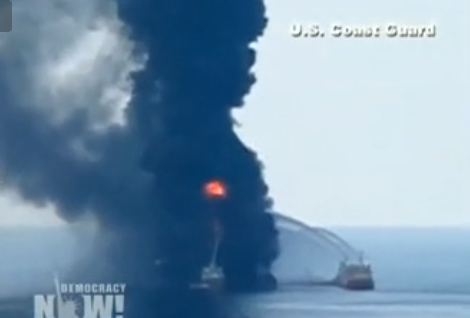Four years after BP’s Deepwater Horizon drilling platform exploded and killed 11 workers, causing more than 200 million gallons of oil to spew into the Gulf of Mexico, the Environmental Protection Agency has lifted a ban that excluded BP from new federal contracts. In a broadcast exclusive, we speak with Elizabeth Birnbaum, who was director of the Minerals Management Service in the Interior Department at the time of the Deepwater Horizon blowout. She was forced out soon after. In her first broadcast interview since her departure, Birnbaum warns the risk of another offshore oil drilling blowout is real. We are also joined by Jaclyn Lopez, staff attorney for the Center for Biological Diversity.
Transcript
This is a rush transcript. Copy may not be in its final form.
AMY GOODMAN: Sunday marked the fourth anniversary of what’s been called the worst man-made environmental disaster in U.S. history. It was April 20th, 2010, when an explosion and fire on BP’s Deepwater Horizon drilling platform killed 11 workers and caused more than 200 million gallons of oil to spew into the Gulf of Mexico. Today, oil continues to wash up on some of the beaches of Louisiana, despite claims made by Gulf Coast residents featured in BP’s television advertisements like this one.
GULF COAST RESIDENT 1: Yeah, last summer I saw certain spots where oil would pool up on the beaches, on the shores. And we saw cleanup crews every day, in my opinion, doing a good job.
GULF COAST RESIDENT 2: It’s as good as it’s ever been. I’ve been here since 1991, and I’ve never seen our beaches look better.
GULF COAST RESIDENT 3: I honestly kind of expected it, our beach, to be messed up for a while and really to see the effects of it. But, I mean, it’s nice and clean, as you can see.
AMY GOODMAN: That’s an ad by BP. The oil company says it spent more than $14 billion responding to the spill and cleaning the coastline, and it recently announced it’s ending its “active cleanup” in Louisiana. Similar operations ended last summer in Alabama, Florida and Mississippi.
Meanwhile, last month the Environmental Protection Agency lifted a 2012 ban excluding BP from new federal contracts. The ban was put in place after the EPA found the company failed to fully correct problems that led to the well blowout in 2010. BP had sued to have the suspension lifted. The consumer advocacy group Public Citizen said in a statement the settlement, quote, “lets a corporate felon and repeat offender off the hook for its crimes against people and the environment.” Just days after the ban was lifted, during an auction in New Orleans, BP bid $42 million to win 24 new leases in the Gulf of Mexico.
Well, in a broadcast exclusive, we’re joined now by Elizabeth Birnbaum. She was director of the Minerals Management Service at the time of the Deepwater Horizon blowout. She’s now a consultant at SEB Strategies. She recently co-wrote an op-ed for The New York Times headlined “The Deepwater Horizon Threat,” where she expresses concern that, quote, “The risk of another blowout is real. Offshore wells have lost control several times in the [past] year,” she said. This is Birnbaum’s first broadcast interview since she left the Department of Interior shortly after the BP spill. She’s joining us from Washington, D.C.
Liz Birnbaum, welcome to Democracy Now! Talk about this risk you have written about four years after the BP spill.
Read the full transcript at the Democracy Now! site






